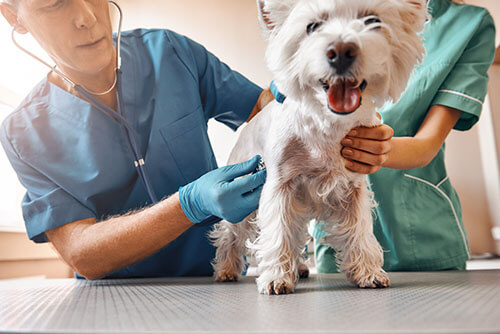Veterinarians are People Too
Sep 14, 2020

By Kevin Cox, DVM
Most of the time when you have an interaction with your veterinarian, the primary concern is your animal’s welfare…. a beloved pet, an equine partner, or livestock that is part of your livelihood.
The focus is often on obtaining information and guidance from your veterinarian. Your veterinarian spent many years educating and preparing to be able to offer proper care for your animal. At the very least, there were three to four years of prerequisite courses and maybe even an undergraduate degree. Then, four-years of intense vet school.
Some veterinarians even choose to complete a yearlong internship or possibly a three-year residency after vet school to specialize in a particular area of interest. After completing their education, most veterinarians will have invested a minimum of seven years of education post high school and unfortunately, many will have accumulated a significant amount of student loans to pay for that education. Regardless, starting salaries for veterinarians after graduation are often not comparable to other professions that require the same amount of education.
In spite of the huge investment in time for education and modest compensation, most veterinarians are motivated by a deep sense of caring for animals. This deep love for animals, while evident in the way your veterinarian cares for your animal, often produces a source of grief for veterinarians. Your veterinarian is concerned when your animal is sick, worries about making the right diagnosis, and grieves if your animal is gravely ill…. severely if the animal dies. While a large part of veterinary medicine is focused on preventative medicine, another significant portion deals with sickness, injury, and other more serious aspects of your animal’s life.
The emotional toll for the veterinarian is often overshadowed by that of the owner. Certainly, the owner shoulders the most concern, yet the veterinarian’s intense love for animals and concern for their wellbeing gives them their fair share of worry as well. Veterinarians worry at night about the stray dog someone dropped off at the clinic who has no home. They worry about the colicing horse they treated and pray the meds work and it doesn’t need a referral for surgery. Veterinarians worry about the cow they treated for grass tetany and wonder if she will need another round of magnesium. Veterinarians grieve (and yes, even cry) when they have to euthanize a beloved pet because of a terminal illness. Veterinary medicine is an extremely rewarding profession; it is also emotionally exhausting.
Veterinarians are people too. They love and care for your animals just as you do. Next time you have a visit with your veterinarian, thank them for their advice and guidance but also for their love and passion for all creatures great and small.
Most of the time when you have an interaction with your veterinarian, the primary concern is your animal’s welfare…. a beloved pet, an equine partner, or livestock that is part of your livelihood.
The focus is often on obtaining information and guidance from your veterinarian. Your veterinarian spent many years educating and preparing to be able to offer proper care for your animal. At the very least, there were three to four years of prerequisite courses and maybe even an undergraduate degree. Then, four-years of intense vet school.
Some veterinarians even choose to complete a yearlong internship or possibly a three-year residency after vet school to specialize in a particular area of interest. After completing their education, most veterinarians will have invested a minimum of seven years of education post high school and unfortunately, many will have accumulated a significant amount of student loans to pay for that education. Regardless, starting salaries for veterinarians after graduation are often not comparable to other professions that require the same amount of education.
In spite of the huge investment in time for education and modest compensation, most veterinarians are motivated by a deep sense of caring for animals. This deep love for animals, while evident in the way your veterinarian cares for your animal, often produces a source of grief for veterinarians. Your veterinarian is concerned when your animal is sick, worries about making the right diagnosis, and grieves if your animal is gravely ill…. severely if the animal dies. While a large part of veterinary medicine is focused on preventative medicine, another significant portion deals with sickness, injury, and other more serious aspects of your animal’s life.
The emotional toll for the veterinarian is often overshadowed by that of the owner. Certainly, the owner shoulders the most concern, yet the veterinarian’s intense love for animals and concern for their wellbeing gives them their fair share of worry as well. Veterinarians worry at night about the stray dog someone dropped off at the clinic who has no home. They worry about the colicing horse they treated and pray the meds work and it doesn’t need a referral for surgery. Veterinarians worry about the cow they treated for grass tetany and wonder if she will need another round of magnesium. Veterinarians grieve (and yes, even cry) when they have to euthanize a beloved pet because of a terminal illness. Veterinary medicine is an extremely rewarding profession; it is also emotionally exhausting.
Veterinarians are people too. They love and care for your animals just as you do. Next time you have a visit with your veterinarian, thank them for their advice and guidance but also for their love and passion for all creatures great and small.